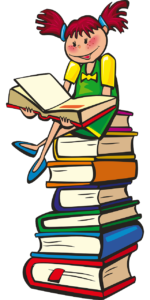I have some basic recommendations and resources for novice writers. My list is not an extensive list, but I hope you will find it useful…it has helped me over the years. I must preface: I am a children’s author, so, many of the resources I’m recommending are geared towards children’s book writers.
The very first resource that ANY writer should utilize frequently is the local library. Your local library has thousands of books available, for free, to check out. There was a time in my life (the very beginning stages of writing) where I bought numerous picture books so that I can read and study them. I soon realized that I was going financially broke in the process. The library provides you the opportunity to checkout many books, in ranging genres. And, when the mood strikes you and a particular book resonates with you—go buy it!
First step—use your local library!
Once you realize that your local public library is an asset to your writing career, next I’d recommend Reading For Research. For those that write picture books, there is a particular Reading For Research (ReFoRe) website that provides specific recommendations for picture books in different categories: STEM, Non-fiction, humorous, grieving, etc, etc, etc. For those who do not write picture books, there are many reading lists out in the virtual world. Find a list that inspires you, checkout those books, and read. Before you know it, you’ll be creating your own ReFoRe list.
Step two—read!

It’s necessary to read because reading helps you improve your writing craft. Reading allows you to hone in your writing skills. Reading inspires ideas. Reading provides opportunity to find mentor texts. And, reading helps you understand the market much better. So, get to your local library, with your ReFoRe book list, and get to checking out books.
BUT…don’t let the “to be read pile” get too big because that in itself can be daunting and intimating. Make realistic goals of how many books you want to read within a month. And don’t just read them, analyze them. What year were they published and published by which press? What do you like about the book and what do you dislike? Study the books and take notes.
Next, join an organization:
There are two main organizations that focus on children’s book creators: SCBWI and 12X12 Challenge.
SCBWI (Society of Children’s Book Writers and Illustrators) has been around for over 50 years! SCBWI provides online workshops, in person conferences, awards and grants, opportunities for diverse writers, has regional chapters, and is overall a wonderful resource to utilize. It does cost a pretty penny, however. So, if you’re going to become a member, of which I recommend, make sure to use this resource to your benefit and be an active member.
12X12 Challenge is a year-long writing challenge where members aim to write 12 complete picture book drafts (one per month). They provide monthly webinars and an online community of critique partners. This, too, costs a pretty penny, so make sure to use the resources and be an active member.
Fourth: Try to attend workshops and/or classes.
The Highlights Foundation has been offering workshops, retreats, and scholarships to children’s writers for 35 years. It’s in Pennsylvania, however. There are lots of workshops throughout the country so I advise you to google and see if there is a writing workshop or class near you.
Fifth: Be engaged with the writing community.
Make connections on social media. Identify your brand to the community. There are many Twitter events and pitch events like DVpit, PBPitch, and PitMad that can help you hone in your pitch (participate for fun and try not to stress if you don’t get an agent like).

And finally: Join a critique group.
Having a group of a few writer friends, who are committed to supporting each other’s writing career, is crucial. These virtual friends provide honest critique of your manuscripts and provide insight that may have been overlooked. The expectation is that you will do the same for them. Critique groups provide a community that holds itself accountable to write and revise.
Look! There are endless books on writing and publishing (check some out from your local library, but don’t overwhelm yourself). There are numerous podcasts that talk all things writing (but don’t stress about hearing them all). There’s an infinite amount of useful websites and informative blogs (pick one or two of them and utilize them as resources.)
Clearly, there is a plethora of information out there and it could get overwhelming with the amount of resources that are available.
So, in summery, what I recommend to be a productive and successful writer is:
- Use your local library monthly and read often.
- Join at least one organization and be an active member.
- Attend a conference or workshop in person, or join classes virtually, at least once a year.
- Be an engaged and active participant with the writing community on social media. Check out Twitter’s #WritingCommunity.
- Have critique partners and support each other’s proverbial backs.
- WRITE. And then write some more.
The rest will come to you; the learning of how to research agents and how to query them will come to you once you utilize the steps above.

In this writing journey it is important to remember what Walt Disney said:
“All our dreams can come true, if we have the courage to purse them.”
Walt Disney’s Four C’s for making dreams come true are:
- Curiosity
- Courage
- Consistency
- Confidence
Good luck on your writing adventure!

You make it sound easy! Thanks for those recommendations. I do need to remember to utilize my local library more.